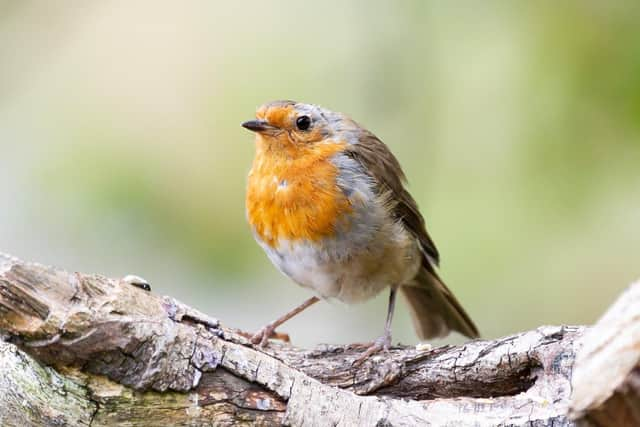Britain's favourite festive bird needs public help to survive this winter
Robin Redbreast - the UK’s ‘national bird’ is amongst the country’s favourite birds and particularly around Christmas time.
However, it is under increasing danger due to unpredictable weather patterns, and wildlife experts are encouraging the public to support robins and other native birds in their gardens this winter.
Advertisement
Hide AdAdvertisement
Hide AdReports are also saying that the UK is likely to experience a colder, drier and less windy early winter and this week alone overnight temperatures plummeted to almost -6C in some UK areas.


A robin, which on average weighs between 14 and 21 grams, can use up to 10 per cent of its body weight to keep warm on a single winter night, so unless it can replenish its reserves every day, a cold spell can prove fatal.
Unusual weather patterns have swept the UK, with record heatwaves in the summer to an unseasonably warm October and November, and a harsh winter coming up – unseasonal weather is a threat to UK wildlife, causing confusion and throwing natural cycles of certain species out of sync.
Wildlife doesn’t always know how to deal with these extreme and unpredictable weather conditions and, as a result, it is unknown what the true impact on nature will be, which is why support for garden wildlife wherever possible is needed.
Advertisement
Hide AdAdvertisement
Hide AdSean McMenemy, garden wildlife expert and director of Ark Wildlife, has given an insight into how the public can help robins in their gardens this year.


During a cold winter, up to half of our garden birds can be lost to cold and hunger. Robins are particularly susceptible as they remain faithful to their gardens no matter what the weather. Putting out food, water and shelter for birds visiting your garden can make a big difference to survival rates.
Garden bird populations all over the UK have fallen – the Red List of endangered bird species is more than double the size it was 25 years ago. Because there are fewer hedgerows, there is a lack of natural food. Without supplementary bird feeding in gardens, up to half of our robins could die of cold and starvation.
The best foods to put out for robins are: Mealworms and calci worms, which are especially beneficial because they are insectivores; Fatty foods like suet pellets; Special high protein robin blends; Meaty kitchen scraps; Mild cheese; Cake and biscuit crumbs; Dried fruit; Peanuts (shredded or crushed).
Advertisement
Hide AdAdvertisement
Hide AdRobins prefer to forage and feed off the ground. By placing a small tray full of their favourite food close to a shrub tree or preferred perch, you can encourage them to make your garden a home and spend more time with you day by day. If you’re lucky, robins can quickly become confident in our presence and feeding from the hand is not unknown.


There are also ways to make your garden a home for robins.
Birds cluster together during icy spells to share their warmth. They often use nest boxes as winter shelters, so putting up bird nest boxes can make a huge difference.
These will be used as night roosting sites and places for nesting in the spring. Nest boxes should be placed at least two metres from dense vegetation in order to prevent surprise attacks from cats.
Place plenty of water sources in the garden. Bird tables make a big difference to the survival rate of robins in urban and suburban areas.
Advertisement
Hide AdAdvertisement
Hide AdAs with any garden wildlife, it’s also worth ensuring that your garden isn’t too pristine or tidy – some wild undergrowth will encourage the proliferation of insects and help robins to find food.
The RSPB says that on average, robins only live a couple of years, but a few reach quite an advanced age. The oldest known wild individual was 11 years 5 months.
Mortality is high and its causes are many and varied. Only around 40 per cent of fledged birds will survive from one year to the next. High levels of mortality are compensated for by high productivity and the robin population has increased by 45 per cent since 1970.
But, severe winter weather can have severe impacts on robins, the charity added.
Advertisement
Hide AdAdvertisement
Hide AdIn normal circumstances the fat reserves built up by the bird will keep it going for a few days, but mortality tends to increase rapidly if a cold spell continues into a second week.
The RSPB’s Big Garden Birdwatch returns next year from January 27 to 29.
